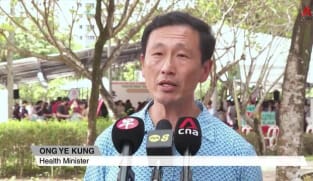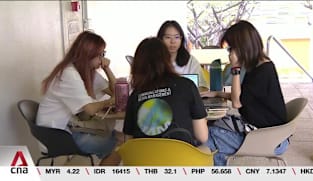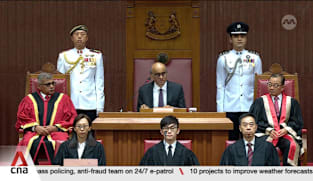Ong Ye Kung on supporting healthcare
In transforming Singapore’s healthcare system, the Government is prioritising areas where it can make the most meaningful changes. So, it is focusing on expanding healthcare capacity, rolling out Healthier SG and building an effective system for ageing in the community. Health Minister Ong Ye Kung said this in Parliament on Wednesday (May 10) during the debate on a motion calling for a whole-of-Government approach to supporting healthcare beyond the COVID-19 pandemic. Mr Ong said the tremendous potential of inter-agency collaboration witnessed in the fight against COVID-19 must now be taken even further. This is especially relevant to healthcare for two reasons. First, Singapore is about to become a “super-aged” society, which will have implications across multiple policy areas. Second, the country is effecting a major healthcare transformation, going beyond treating sickness in hospitals and clinics to creating health in homes and communities. This means “health for all”, which will require “all for health”, said Mr Ong. He listed stakeholders who can make significant contributions - employers, who can work with panel doctors to join Healthier SG and implement better work-life balance; community partners, who can proliferate physical activities in the community; schools and educational institutions, which can build foundations for good health in the young; the media, which is the first line of defence against health misinformation; and infrastructure and transport planners, whose work can support active living. The minister also addressed several issues that emerged during the debate. One was manpower. He said recruitment of local and foreign healthcare workers is “of particular urgency” given the rising attrition suffered during the COVID-19 pandemic. He said a suggestion by several MPs to grant permanent residency to the dependents of well-performing foreign healthcare workers is “worth serious consideration”. Meanwhile, a zero-tolerance policy on abuse and harassment of healthcare workers will become guidelines in the second half of this year. Supervisors will be empowered to disengage with abusive patients or their next-of-kin. Mr Ong said these consequences will only be effected for the most genuine cases and care will always be prioritised. He also spoke on the issue of healthcare financing. Responding to NCMP Leong Mun Wai who had said the Government ought to spend more on healthcare like other OECD countries, Mr Ong said spending more on healthcare does not mean better health outcomes. He said Singapore delivers very good health outcomes given what it spends, which is four per cent of GDP. It is also able to make healthcare affordable for middle- to lower-income groups. In fact, it is already spending more and more on healthcare, driven by an ageing population which is getting sicker. Its challenge, therefore, is to not go the way of many OECD countries, with the healthcare fiscal burden spiralling out of control. Mr Ong also said Mr Leong failed to mention that more Government expenditure ultimately has to be raised through taxes. He said it is better to continue with the current “sensible and practical approach” - having layers of safety nets, which will now be combined with the Healthier SG strategy so that Singapore can reduce its disease burden even as its population ages.
In transforming Singapore’s healthcare system, the Government is prioritising areas where it can make the most meaningful changes. So, it is focusing on expanding healthcare capacity, rolling out Healthier SG and building an effective system for ageing in the community. Health Minister Ong Ye Kung said this in Parliament on Wednesday (May 10) during the debate on a motion calling for a whole-of-Government approach to supporting healthcare beyond the COVID-19 pandemic. Mr Ong said the tremendous potential of inter-agency collaboration witnessed in the fight against COVID-19 must now be taken even further. This is especially relevant to healthcare for two reasons. First, Singapore is about to become a “super-aged” society, which will have implications across multiple policy areas. Second, the country is effecting a major healthcare transformation, going beyond treating sickness in hospitals and clinics to creating health in homes and communities. This means “health for all”, which will require “all for health”, said Mr Ong. He listed stakeholders who can make significant contributions - employers, who can work with panel doctors to join Healthier SG and implement better work-life balance; community partners, who can proliferate physical activities in the community; schools and educational institutions, which can build foundations for good health in the young; the media, which is the first line of defence against health misinformation; and infrastructure and transport planners, whose work can support active living. The minister also addressed several issues that emerged during the debate. One was manpower. He said recruitment of local and foreign healthcare workers is “of particular urgency” given the rising attrition suffered during the COVID-19 pandemic. He said a suggestion by several MPs to grant permanent residency to the dependents of well-performing foreign healthcare workers is “worth serious consideration”. Meanwhile, a zero-tolerance policy on abuse and harassment of healthcare workers will become guidelines in the second half of this year. Supervisors will be empowered to disengage with abusive patients or their next-of-kin. Mr Ong said these consequences will only be effected for the most genuine cases and care will always be prioritised. He also spoke on the issue of healthcare financing. Responding to NCMP Leong Mun Wai who had said the Government ought to spend more on healthcare like other OECD countries, Mr Ong said spending more on healthcare does not mean better health outcomes. He said Singapore delivers very good health outcomes given what it spends, which is four per cent of GDP. It is also able to make healthcare affordable for middle- to lower-income groups. In fact, it is already spending more and more on healthcare, driven by an ageing population which is getting sicker. Its challenge, therefore, is to not go the way of many OECD countries, with the healthcare fiscal burden spiralling out of control. Mr Ong also said Mr Leong failed to mention that more Government expenditure ultimately has to be raised through taxes. He said it is better to continue with the current “sensible and practical approach” - having layers of safety nets, which will now be combined with the Healthier SG strategy so that Singapore can reduce its disease burden even as its population ages.



















